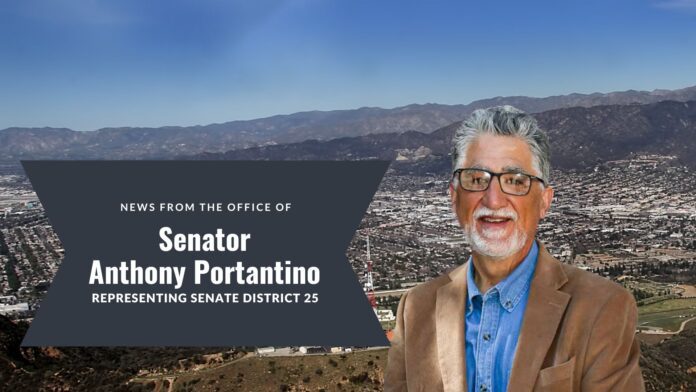Senate Bills 1147, 1100, 607, and 551, authored by Senator Anthony J. Portantino (D – Burbank), have been signed into law. SB 1147 requires the study of the health impacts of microplastics in drinking water. SB 1100 addresses discrimination against individuals who do not have driver’s licenses, and SB 607 is aimed at combatting the opioid crisis by requiring prescribers of controlled substances containing an opioid to discuss dangers of opioids with all patients. Finally, SB 551 addresses reporting practices across plastic beverage manufacturing companies’ product lines.
SB 1147
In 2018, there was an average of 325 pieces of microplastics identified in a liter of bottled water. Currently, California’s water bottling facilities do not test for microplastics, nor do they have a method to test for microplastics. SB 1147 will address these deficiencies in public health.
“With growing concern and increased reports about the health risks associated to microplastics, it is past time we formally study their impacts,” stated Senator Portantino. “SB 1147 aims to establish a safe level of microplastics in drinking water and puts forth a strategy that would ensure safer consumption. The bill encompasses the study of both tap and bottled water, which will ensure that all drinking water is treated consistently to protect public health.”
SB 1147 requires the Office of Environmental Health Hazard Assessment (OEHHA) to share biennial studies that explore the health impacts of microplastics in drinking and bottled water to evaluate toxicity characteristics and identify levels of microplastics that are not anticipated to cause or contribute to adverse health effects, or to identify any data gaps that would need to be addressed to establish those levels. After considering the findings of the report, the State Water Resources Control Board (SWRCB) may request OEHHA prepare and publish a public health goal for microplastics in drinking water.
“The right to clean drinking water is unalienable, undeniable, and undisputed,” stated Andy Hattala, Policy Co-Lead for the Climate Reality Project’s California Coalition. “For this reason, we have the California Safe Drinking Water Act to enable the regulation of water and guarantee access to it. Unfortunately, the purity and safety of water are constantly vulnerable to contamination, must be regulated, and must be protected. One such item now prevalent in our water supplies with potential adverse health impacts is microplastics. With ever-increasing plastic consumption -the source of microplastics – studying, reporting, and regulating the presence of microplastics in water is imperative. This bill would further the necessary research to establish current levels of plastic contamination, determine if any amount of microplastics is safe, and inform our efforts to safely use plastic which shed microplastics.”
Senator Portantino has a history of authoring environmentally friendly water bills. In 2018, he authored SB 1422 – the California Safe Drinking Water Act. The bill required the State Water Resources Control Board (SWRCB) to adopt requirements for testing and reporting and to formalize a definition of microplastics in drinking water. The same year, the Governor also signed Senator Portantino’s SB 1263, requiring the California Ocean Protection Council (OPC) to adopt a statewide research strategy and identify early actions to reduce microplastic pollution in California’s marine environment.
SB 230 was also authored by Senator Portantino in 2022 to improve consumer protection by requiring the State Water Board to gather information to understand the public health risk of contaminants in drinking water.
SB 1100
In California, the practice of requiring a driver’s license as a condition for employment, regardless of whether driving is a required aspect of the job, has become increasingly prevalent. This practice poses significant barriers for certain segments of our population, including young adults, the elderly, individuals with disabilities, and those who choose not to drive due to environmental concerns or personal preferences. It also disproportionately affects low-income individuals and communities of color, who may have less access to personal transportation or face higher rates of driver’s license suspensions due to unpaid fines or fees.
“Requiring a driver’s license for employment instead of other forms of identification may result in systematic exclusion for a job that doesn’t require driving,” stated Senator Portantino. “SB 1100 will end this discrimination and create a more just and equitable system for Californians who don’t drive. It’s a sensible solution and I am grateful to the Governor for signing the bill into law.”
SB 1100 addresses discrimination against individuals who do not have driver’s licenses and seek employment for a job that does not require driving. Under SB 1100, employers will no longer be able to require a driver’s license as a condition of employment.
“SB 1100 will expand job opportunities for people who either choose to not drive or are unable to drive, who are disproportionately people of color and people with disabilities who already face significant barriers to employment,” stated Kirsten Bladh, Associate Policy Director of Streets for All. “We thank Senator Portantino for authoring this important measure and thank the Governor for his signature.”
SB 607
Prescription opioids continue to be a significant public safety issue and accounted for 17,000 of the overdose deaths in 2021. According to California’s health department, opioid related deaths spiked 121% between 2019 and 2021. The most recent state data indicates that between September 2021 and September 2022, up to 5,942 people died after ingesting a synthetic opioid, accounting for 86% of all opioid related deaths. SB 607 expands requirements for prescribers to discuss risks and dangers associated with opioid addiction with all patients.
“I am grateful to Governor Newsom for signing this life saving measure into law. When prescribers discuss detailed information about opioids with every patient, it gives more individuals the chance to decline an opioid prescription and explore alternative treatment options if they prefer,” stated Senator Portantino. “It’s crucial for patients to be fully aware of the risks associated with opioid-containing medications before using them. Given the opioid crisis we are currently facing, something as simple as effective communication can save lives.”
“On behalf of the Medical Board of California, I’d like to thank the Governor for signing SB 607 into law,” said Mr. Reji Varghese, Executive Director of the Medical Board of California. “SB 607 promotes the safe use of opioids by helping to ensure that providers and patients have important discussions when these medications are being prescribed. The Board’s July 2023 guidelines for treating patients with pain underscore the importance of patient counseling on these matters.”
SB 551
The narrow interpretation of “beverage manufacture” in the context of AB 793 (signed into law in 2020), which refers to every individual bottling plant, has created challenges in compliance and a burdensome reporting process.
“The ability to report across all product lines will simplify reporting and create standard reporting practices,” stated Senator Portantino. “This bill clarifies the agreement from AB 793, allowing beverage companies to report and meet mandatory minimum content requirements for their entire portfolio instead of by individual products.”
SB 551 allows beverage manufacturers to demonstrate compliance with the state’s recycled content requirements for beverage containers by submitting a consolidated report to the Department of Resources Recycling and Recovery (CalRecycle).





















